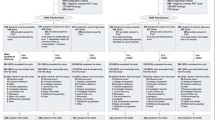Abstract
Given the high prevalence of HIV-associated neurocognitive disorders (HAND), we examined the performance of a novel computerized cognitive assessment device (NCAD) for the evaluation of neurocognitive impairment in the setting of HIV. In addition to a standard 8-test neuropsychological battery, each participant underwent testing with the NCAD, which requires approximately 20 min and has been shown to accurately measure neurocognition in elderly individuals. The NCAD yields seven subtest scores in addition to an overall predictive score that is calculated based on subtest results. Thirty-nine HIV-infected participants were included in this study; the majority of which (71.8 %) had undetectable plasma HIV RNA levels and a history of significant immunocompromise (median nadir CD4+ count 34 cells/μl). The mean composite neuropsychological score (NPT-8) was 46.07, and mean global deficit score (GDS) was 0.59. NCAD total subtest accuracy correlated significantly with NPT-8 (Pearson correlation r = 0.59, p < 0.0001) as well as GDS (Spearman’s rho = −0.36, p = 0.02). NCAD predictive score also correlated significantly with NPT-8 (Spearman’s rho = −0.5601, p = 0.0016) and GDS (Spearman’s rho = 0.45, p = 0.0144). When using the most recent nosology of HAND criteria for neurocognitive impairment, the area under the curve (AUC) for NCAD total subtest accuracy was 0.7562 (p = 0.012), while the AUC for the HIV dementia scale was 0.508 (p = 0.930). While not as comprehensive as a full neuropsychological battery, the NCAD shows promise as a rapid screening tool for HIV-infected individuals, and additional research of this device is indicated.



Similar content being viewed by others
References
Antinori A, Arendt G, Becker JT, Brew BJ, Byrd DA, Cherner M, Clifford DB, Cinque P, Epstein LG, Goodkin K, Gisslen M, Grant I, Heaton RK, Joseph J, Marder K, Marra CM, McArthur JC, Nunn M, Price RW, Pulliam L, Robertson KR, Sacktor N, Valcour V, Wojna VE (2007) Updated research nosology for HIV-associated neurocognitive disorders. Neurology 69:1789–99
Berghuis JP, Uldall KK, Lalonde B (1999) Validity of two scales in identifying HIV-associated dementia. J Acquir Immune Defic Syndr 21:134–40
Bottiggi KA, Chang JJ, Schmitt FA, Avison MJ, Mootoor Y, Nath A, Berger JR (2007) The HIV dementia scale: predictive power in mild dementia and HAART. J Neurol Sci 260:11–5
Brouillette MJ, Mayo N, Fellows LK, Lebedeva E, Higgins J, Overton ET, Ances BM, Koski L (2015) A better screening tool for HIV-associated neurocognitive disorders: is it what clinicians need? AIDS 29:895–902
Carey CL, Woods SP, Gonzalez R, Conover E, Marcotte TD, Grant I, Heaton RK, Group H (2004) Predictive validity of global deficit scores in detecting neuropsychological impairment in HIV infection. J Clin Exp Neuropsychol 26:307–19
Clifford DB (2008) HIV-associated neurocognitive disease continues in the antiretroviral era. Top HIV Med 16:94–8
Gendelman HE (2012) The neurology of AIDS. Oxford University Press, Oxford
Haddow LJ, Floyd S, Copas A, Gilson RJ (2013) A systematic review of the screening accuracy of the HIV Dementia Scale and International HIV Dementia Scale. PLoS One 8
Heaton RK, Miller SW, Taylor MJ, Grant I (2004) Revised comprehensive norms for an expanded Halstead-Reitan Battery: demographically adjusted neuropsycho-logical norms for African American and Caucasian adults scoring program
LaPlaca ME, T.; Ciaravella, N.; Hendershot, K.; Liu, B.; Smith, S.; Kobic, A.; Crooks, C.; Gore, R.; Knezevic, A.; Phelps, S.; Wright, D. (2015). Correlation of impact acceleration and neuropsychological performance in unconcussed high school and collegiate football players Biomedical Engineering Society (BMES) Annual Meeting, Tampa, Florida, USA October 7–10, 2015
Norman MA, Moore DJ, Taylor M, Franklin D Jr, Cysique L, Ake C, Lazarretto D, Vaida F, Heaton RK, Group H (2011) Demographically corrected norms for African Americans and Caucasians on the Hopkins Verbal Learning Test-Revised, Brief Visuospatial Memory Test-Revised, Stroop Color and Word Test, and Wisconsin Card Sorting Test 64-Card Version. J Clin Exp Neuropsychol 33:793–804
Overton ET, Azad TD, Parker N, Demarco Shaw D, Frain J, Spitz T, Westerhaus E, Paul R, Clifford DB, Ances BM (2013) The Alzheimer’s disease-8 and Montreal Cognitive Assessment as screening tools for neurocognitive impairment in HIV-infected persons. J Neurovirol 19:109–16
Robertson K, Yosief S (2014) Neurocognitive assessment in the diagnosis of HIV-associated neurocognitive disorders. Semin Neurol 34:21–6
Skinner S, Adewale AJ, DeBlock L, Gill MJ, Power C (2009) Neurocognitive screening tools in HIV/AIDS: comparative performance among patients exposed to antiretroviral therapy. HIV Med 10:246–52
Valcour V, Paul R, Chiao S, Wendelken LA, Miller B (2011) Screening for cognitive impairment in human immunodeficiency virus. Clin Infect Dis 53:836–42
Wright DW, Goldstein FC, Kilgo P, Brumfield JR, Ravichandran T, Danielson ML, Laplaca M (2010) Use of a novel technology for presenting screening measures to detect mild cognitive impairment in elderly patients. Int J Clin Pract 64:1190–7
Wright DW, Nevarez H, Kilgo P, LaPlaca M, Robinson A, Fowler S, Brumfield J, Goldstein FC (2011) A novel technology to screen for cognitive impairment in the elderly. Am J Alzheimers Dis Other Demen 26:484–91
Author information
Authors and Affiliations
Corresponding author
Ethics declarations
Conflict of interest
The authors declare that they have no conflict of interest.
Funding
Emory Medical Care Foundation
NIH K23MH095679
NIH P30 AI050409 (Emory Center for AIDS Research)
Disclaimer
No financial disclosures to report.
Rights and permissions
About this article
Cite this article
Anderson, A.M., Lennox, J.L., Nguyen, M.L. et al. Preliminary study of a novel cognitive assessment device for the evaluation of HIV-associated neurocognitive impairment. J. Neurovirol. 22, 816–822 (2016). https://doi.org/10.1007/s13365-016-0458-z
Received:
Revised:
Accepted:
Published:
Issue Date:
DOI: https://doi.org/10.1007/s13365-016-0458-z




